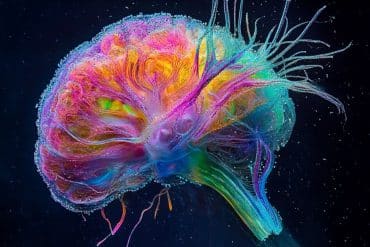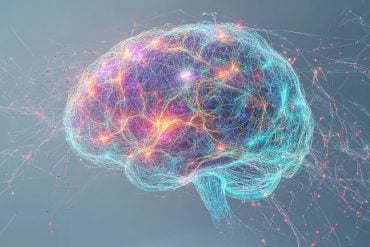Summary: Resveratrol, a compound found in red wine, may help to combat depression and anxiety. The compound inhibits PDE4, an enzyme induced bt excessive amounts of corticosterone, which causes depression-like symptoms in mouse models.
Source: University at Buffalo
Like to unwind with a glass of red wine after a stressful day? Don’t give alcohol all the credit.
New research has revealed that the plant compound resveratrol, which is found in red wine, displays anti-stress effects by blocking the expression of an enzyme related to the control of stress in the brain, according to a University at Buffalo-led study.
The findings shed light on how resveratrol impacts neurological processes. According to the Anxiety and Depression Association of America, depression and anxiety disorders affect 16 and 40 million people respectively in the United States.
“Resveratrol may be an effective alternative to drugs for treating patients suffering from depression and anxiety disorders,” says Ying Xu, MD, Ph.D., co-lead author and research associate professor in the UB School of Pharmacy and Pharmaceutical Sciences.
The study, published on July 15 in the journal Neuropharmacology, was also led by Xiaoxing Yin, Ph.D., professor at Xuzhou Medical University in China.
Protection Against Extreme Stress
Resveratrol, which has been linked to a number of health benefits, is a compound found in the skin and seeds of grapes and berries. While research has identified resveratrol to have antidepressant effects, the compound’s relationship to phosphodiesterase 4 (PDE4), an enzyme influenced by the stress hormone corticosterone, was unknown.
Corticosterone regulates the body’s response to stress. Too much stress, however, can lead to excessive amounts of the hormone circulating in the brain and, ultimately, the development of depression or other mental disorders.
These unknown physiological relationships make drug therapy complex. Current antidepressants instead focus on serotonin or noradrenaline function in the brain, but only one-third of patients with depression enter full remission in response to these medications, says Xu.
In a study on mice, researchers revealed that PDE4, induced by excessive amounts of corticosterone, causes depression- and anxiety-like behavior.

The enzyme lowers cyclic adenosine monophosphate — a messenger molecule that signals physiological changes such as cell division, change, migration and death — in the body, leading to physical alterations in the brain.
Resveratrol displayed neuroprotective effects against corticosterone by inhibiting the expression of PDE4. The research lays the groundwork for the use of the compound in novel antidepressants.
Although red wine contains resveratrol, consumption of alcohol carries various health risks, including addiction.
Additional UB investigators include visiting scholar Xia Zhu and graduate student Victor Zheng in the Department of Pharmaceutical Sciences; and James O’Donnell, PhD, dean and professor of the School of Pharmacy and Pharmaceutical Sciences, whose research is focused on identifying novel molecular targets that mediate antidepressant, anti-anxiety and memory-enhancing effects on behavior.
Source:
University at Buffalo
Media Contacts:
Marcene Robinson – University at Buffalo
Image Source:
The image is in the public domain.
Original Research: Closed access
“The antidepressant- and anxiolytic-like effects of resveratrol: Involvement of phosphodiesterase-4D inhibition”. Ying Xu et al.
Neuropharmacology. doi:10.1016/j.neuropharm.2019.04.022
Abstract
The antidepressant- and anxiolytic-like effects of resveratrol: Involvement of phosphodiesterase-4D inhibition
Resveratrol is a natural non-flavonoid polyphenol found in red wine, which has numerous pharmacological properties including anti-stress and antidepressant-like abilities. However, whether the antidepressant- and anxiolytic-like effects of resveratrol are related to the inhibition of phosphodiesterase 4 (PDE4) and its subtypes remains unknown. The same holds true for the subsequent cAMP-dependent pathway. The first set of studies investigated whether resveratrol exhibited neuroprotective effects against corticosterone-induced cell lesion as well as its underlying mechanism. We found that 100 μM corticosterone induced PDE2A, PDE3B, PDE4A, PDE4D, PDE10 and PDE11 expression in HT-22 cells, which results in significant cell lesion. However, treatment with resveratrol increased cell viability in a dose- and time-dependent manner. These effects seem related to the inhibition of PDE4D, as evidenced by resveratrol dose-dependently decreasing PDE4D expression. In addition, the PKA inhibitor H89 reversed resveratrol’s effects on cell viability. Resveratrol prevented corticosterone-induced reduction in cAMP, pVASP(s157), pCREB, and BDNF levels, indicating that cAMP signaling is involved in resveratrol-induced neuroprotective effects. Not to mention, PDE4D knockdown by PDE4D siRNA potentiated the effect of low dose of resveratrol on cAMP, pVASP, pCREB, and BDNF expression, while PDE4D overexpression reversed the effect of high dose of resveratrol on the expression of the above proteins. Finally, the subsequent in vivo data supports the in vitro findings, suggesting that resveratrol-induced antidepressant- and anxiolytic-like effects are mediated by PDE4D. Overall, these findings support the hypothesis that PDE4D-mediated cAMP signaling plays an important role in resveratrol’s protective effects on stress-induced depression- and anxiety-like behavior.






